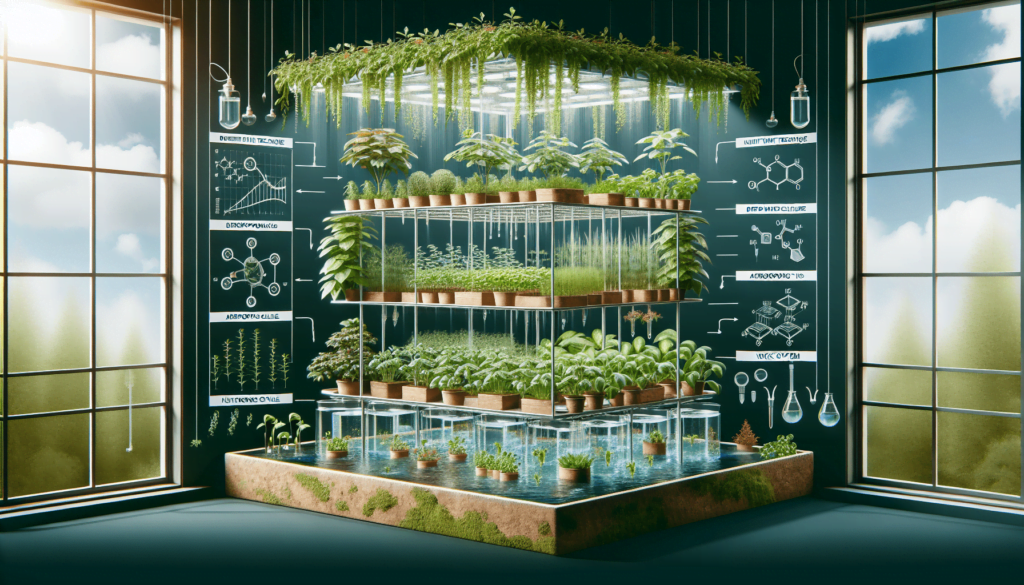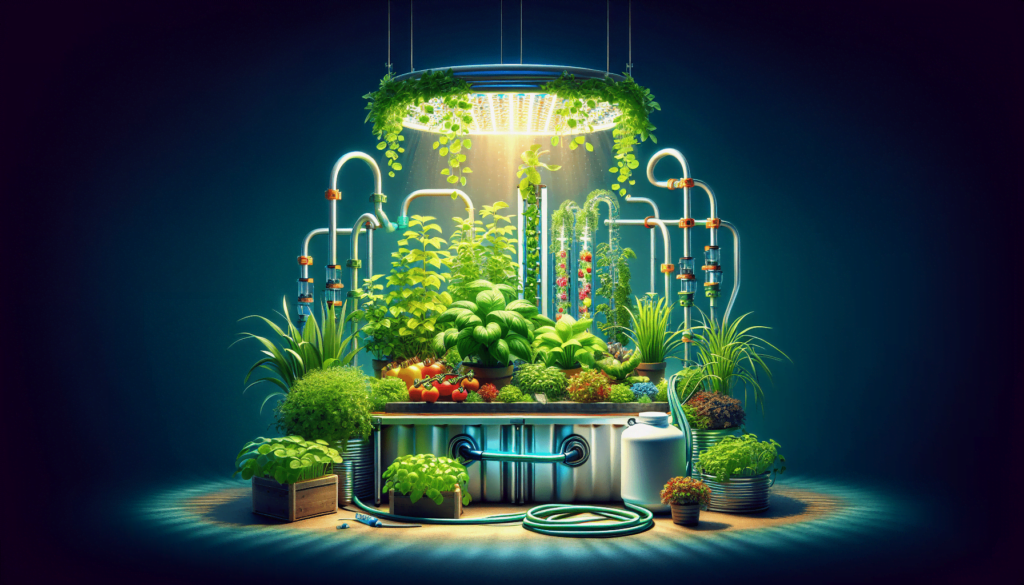Hey there, fellow hydroponics enthusiast! Ever looked at your plants and thought, “Why do you look so sad?” It might be root rot, that sneaky villain causing all the trouble. But don’t worry, we’re here to help you understand and tackle it head-on. Let’s dive deep into the world of root rot and how you can prevent it, keeping your plants happy and healthy.
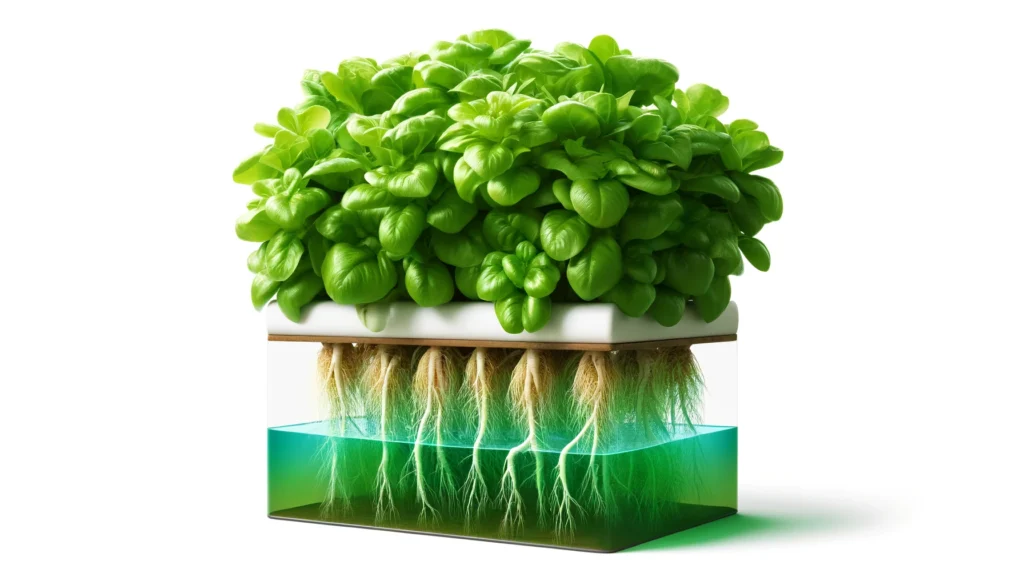
What is Root Rot?
So, what’s the deal with root rot? Imagine this: you’re all set with your hydroponic system, everything’s looking great, and suddenly your plants start to droop, their roots turning brown and slimy. That’s root rot, caused by nasty pathogens like Pythium and Phytophthora. These culprits thrive in wet, poorly aerated environments and can wreak havoc on your beloved plants.
Common Signs
How do you know if your plants have root rot? Here are a few telltale signs:
- Brown or black, mushy roots: Healthy roots are white and firm, so if you see discoloration and softness, it’s a red flag.
- Wilting and yellowing leaves: Despite ample water, your plants look thirsty.
- Stunted growth: Your plants just aren’t growing as they should.
- Foul smell: A bad odor coming from the roots area is a sure sign something’s off.
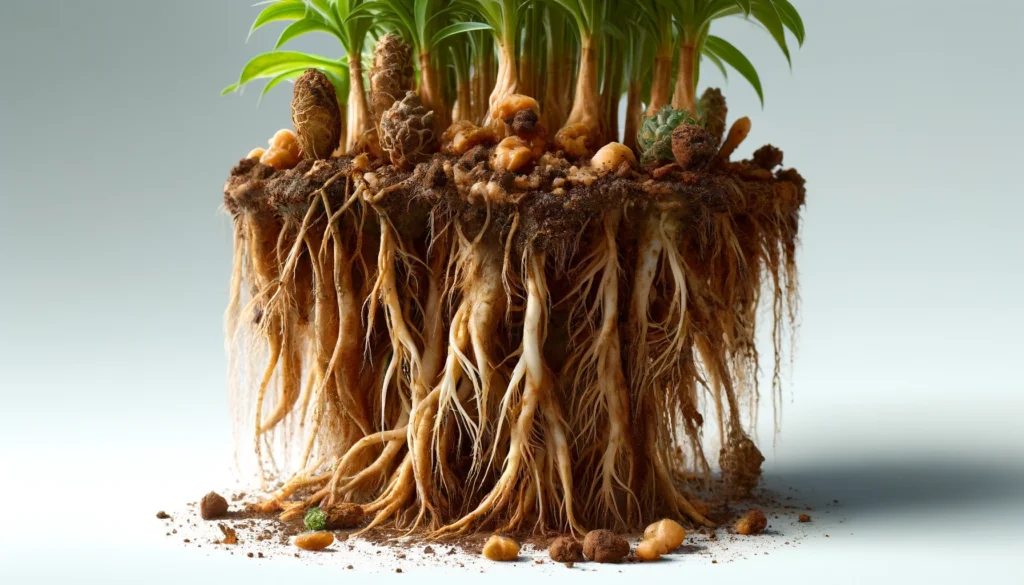
Causes of Root Rot in Hydroponics
Root rot can sneak up on you, but knowing its causes can help you prevent it. Let’s break down the main culprits:
Water Issues
Too much water, poor drainage, and stagnant conditions create a perfect breeding ground for pathogens. Your plants need just the right amount of water, not a swamp!
Temperature Fluctuations
Water temperature plays a huge role. If it’s too warm, it can encourage the growth of pathogens. Keeping a consistent temperature is key to happy roots.
Oxygen Levels
Roots need oxygen to breathe. In hydroponics, if the water isn’t well-oxygenated, roots can suffocate, making them more susceptible to rot.
Nutrient Imbalance
Too much or too little of certain nutrients can weaken your plants, making them more vulnerable to diseases like root rot.
Prevention Strategies
Now, let’s get to the good stuff – how to prevent root rot and keep your plants thriving.
Proper System Design
First things first, let’s make sure your hydroponic system is set up for success.
Drainage
Good drainage is essential. You don’t want your plants sitting in water, so ensure your system allows excess water to drain away.
Aeration
Keep that water moving! Use air stones and pumps to oxygenate the water. Your roots will thank you.
Temperature Control
Managing temperature might sound tricky, but it’s crucial.
Water Temperature
Aim to keep your water temperature between 65°F and 75°F. This range is perfect for your plants and keeps pathogens at bay.
Ambient Temperature
Don’t forget about the room temperature. Keeping it consistent helps maintain a stable water temperature.
Regular Maintenance
A little upkeep goes a long way in preventing root rot.
Cleaning
Regularly clean and sterilize your equipment. This prevents the buildup of harmful pathogens.
Monitoring
Keep an eye on your plants and system. Regular checks can help you catch issues before they become big problems.
Nutrient Management
Balancing nutrients can seem daunting, but it’s essential for healthy plants.
Balanced Nutrient Solution
Make sure your nutrient solution is balanced. Overloading on one nutrient can cause deficiencies in others.
pH Levels
Keep your pH levels in check, ideally between 5.5 and 6.5. This ensures nutrients are available to your plants.
Treatment Options
Sometimes, despite our best efforts, root rot happens. Here’s what to do if you spot it.
Removing Affected Plants
If you see signs of root rot, remove the affected plants immediately. This helps prevent the spread to healthy plants.
Treating the System
Clean and treat your system to eliminate any lingering pathogens. Hydrogen peroxide or beneficial microbes can help cleanse your setup.
Adjusting Conditions
Revisit your setup and conditions. Ensure proper temperature, oxygenation, and nutrient levels to prevent recurrence.
Using LECA to Prevent Root Rot
Have you heard about LECA? This nifty little medium can be a game-changer in preventing root rot.
What is LECA?
LECA stands for Lightweight Expanded Clay Aggregate. It’s a fantastic medium for hydroponics because it’s airy and drains well, making it harder for root rot to take hold.
How LECA Helps
LECA improves aeration and drainage, creating an environment where roots can thrive. It reduces the chances of waterlogging and provides ample oxygen to the roots.
Implementation
Using LECA is straightforward. Simply incorporate it into your hydroponic setup. It’s great for starting seeds and supporting mature plants alike.
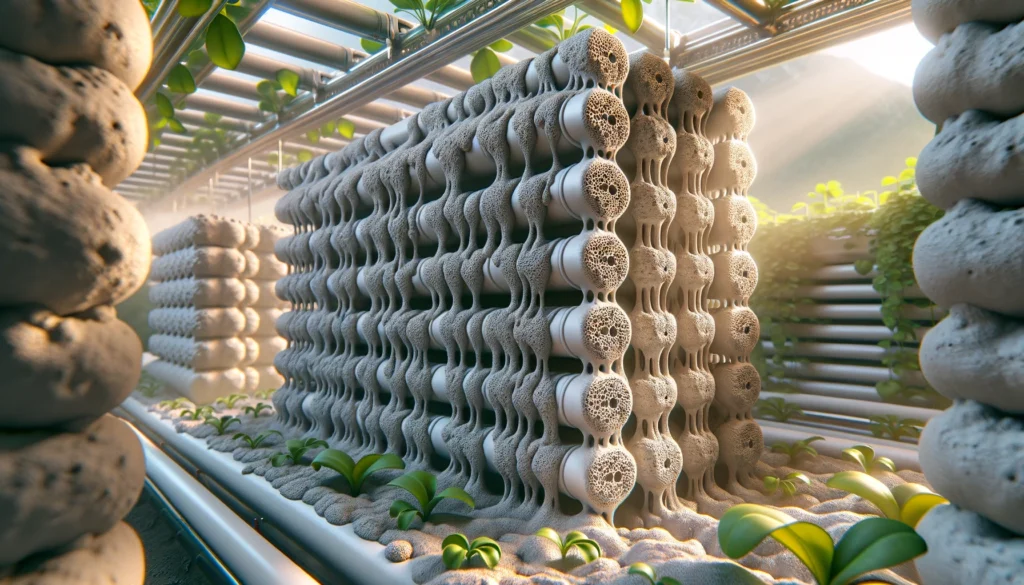
Case Study: Successful Root Rot Prevention
Let’s hear a success story. Meet Sam, a fellow hydroponics gardener who struggled with root rot. Sam tried everything but couldn’t shake the rot. Then, he switched to using LECA and focused on keeping water temperatures stable. The result? Healthy, thriving plants and no more root rot. Sam’s experience shows that with the right strategies, you can beat root rot too.
Lessons Learned
From Sam’s story, we learn that prevention is key. Proper aeration, temperature control, and using LECA can make a significant difference in keeping root rot at bay.
FAQs
Got questions? We’ve got answers!
- What should I do if I suspect root rot?Remove affected plants, clean your system, and adjust conditions to prevent recurrence.
Forum
Got something to share or a question to ask? Jump in and start a conversation! Whether it’s tips, advice, or just sharing your experiences, we’d love to hear from you. Don’t be shy—your input could inspire or help someone else!All about Hydroponics- This forum has 1 topic, and was last updated 10 months, 2 weeks ago by .
Viewing topic 1 (of 1 total)- Topic
- Voices
- Last Post
Viewing topic 1 (of 1 total)- You must be logged in to create new topics.
Register Here
- How often should I clean my hydroponic system?
Regular cleaning, at least once a month, helps prevent pathogen buildup.
Forum
Got something to share or a question to ask? Jump in and start a conversation! Whether it’s tips, advice, or just sharing your experiences, we’d love to hear from you. Don’t be shy—your input could inspire or help someone else!
All about Hydroponics- This forum has 1 topic, and was last updated 10 months, 2 weeks ago by .
Viewing topic 1 (of 1 total)- Topic
- Voices
- Last Post
Viewing topic 1 (of 1 total)- You must be logged in to create new topics.
Register Here
- Can I use LECA in any hydroponic system?
Yes, LECA is versatile and can be used in various hydroponic setups.
Forum
Got something to share or a question to ask? Jump in and start a conversation! Whether it’s tips, advice, or just sharing your experiences, we’d love to hear from you. Don’t be shy—your input could inspire or help someone else!
All about Hydroponics- This forum has 1 topic, and was last updated 10 months, 2 weeks ago by .
Viewing topic 1 (of 1 total)- Topic
- Voices
- Last Post
Viewing topic 1 (of 1 total)- You must be logged in to create new topics.
Register Here
Conclusion
So, there you have it – a friendly guide to tackling root rot in hydroponics. By understanding the causes, implementing prevention strategies, and using helpful tools like LECA, you can keep your plants healthy and thriving. Remember, a little attention and care go a long way.
Ready to beat root rot? Share your experiences and tips in the comments below. Let’s build a community of thriving hydroponic gardeners together. Happy growing!
Related Products…
-
%22%20transform%3D%22translate(.6%20.6)%20scale(1.17188)%22%20fill-opacity%3D%22.5%22%3E%3Cellipse%20fill%3D%22%233a422e%22%20rx%3D%221%22%20ry%3D%221%22%20transform%3D%22rotate(-94.2%20134.6%2017.4)%20scale(22.9657%2086.95504)%22%2F%3E%3Cellipse%20fill%3D%22%23fff%22%20rx%3D%221%22%20ry%3D%221%22%20transform%3D%22rotate(-14.2%20192%20-889)%20scale(75.4383%2042.35707)%22%2F%3E%3Cellipse%20fill%3D%22%23fff%22%20rx%3D%221%22%20ry%3D%221%22%20transform%3D%22matrix(5.5147%20-36.73007%2066.25749%209.94797%2030.1%2026)%22%2F%3E%3Cellipse%20fill%3D%22%2335af88%22%20cx%3D%22128%22%20cy%3D%2275%22%20rx%3D%22167%22%20ry%3D%228%22%2F%3E%3C%2Fg%3E%3C%2Fsvg%3E) TeraGanix EM-1 Plant Growth Microbial Inoculant Concentrate (1 Bottle = 16 Gallons) – Soil Conditioner, Root Enhancer, Liquid Probiotic for Soils & Plants, Seed Germination, Garden$29.70
TeraGanix EM-1 Plant Growth Microbial Inoculant Concentrate (1 Bottle = 16 Gallons) – Soil Conditioner, Root Enhancer, Liquid Probiotic for Soils & Plants, Seed Germination, Garden$29.70 -
%27%20fill-opacity%3D%27.5%27%3E%3Cellipse%20fill%3D%22%23fff%22%20fill-opacity%3D%22.5%22%20rx%3D%221%22%20ry%3D%221%22%20transform%3D%22matrix(-55.87484%209.65126%20-36.7383%20-212.69204%20281%20145.7)%22%2F%3E%3Cellipse%20fill%3D%22%231d1d1d%22%20fill-opacity%3D%22.5%22%20rx%3D%221%22%20ry%3D%221%22%20transform%3D%22matrix(44.48157%20174.50816%20-83.36998%2021.25074%20113.6%20107.2)%22%2F%3E%3Cellipse%20fill%3D%22%23f9f9f9%22%20fill-opacity%3D%22.5%22%20rx%3D%221%22%20ry%3D%221%22%20transform%3D%22matrix(28.64755%20-33.78003%20153.27249%20129.98452%2027.1%20281)%22%2F%3E%3Cellipse%20fill%3D%22%23fff%22%20fill-opacity%3D%22.5%22%20rx%3D%221%22%20ry%3D%221%22%20transform%3D%22rotate(175.2%20137%2039.2)%20scale(41.30739%20169.38156)%22%2F%3E%3C%2Fg%3E%3C%2Fsvg%3E) Ultra-Concentrated Mycorrhizal Fungi Root Stimulator for Strong Plant Roots & Healthy Soil, Trifecta Myco Supreme$19.95
Ultra-Concentrated Mycorrhizal Fungi Root Stimulator for Strong Plant Roots & Healthy Soil, Trifecta Myco Supreme$19.95 -
Product on sale
%27%20fill-opacity%3D%27.5%27%3E%3Cpath%20fill%3D%22%23834f42%22%20fill-opacity%3D%22.5%22%20d%3D%22M-18.2%20160l198%20158.2%2065.7-307z%22%2F%3E%3Cellipse%20fill%3D%22%23fff%22%20fill-opacity%3D%22.5%22%20rx%3D%221%22%20ry%3D%221%22%20transform%3D%22rotate(98.2%2094.1%20187.8)%20scale(298.82813%2049.76002)%22%2F%3E%3Cellipse%20fill%3D%22%23fff%22%20fill-opacity%3D%22.5%22%20rx%3D%221%22%20ry%3D%221%22%20transform%3D%22matrix(5.3205%2063.1521%20-81.8898%206.89914%2048.6%2010)%22%2F%3E%3Cellipse%20fill%3D%22%23f2ffff%22%20fill-opacity%3D%22.5%22%20rx%3D%221%22%20ry%3D%221%22%20transform%3D%22matrix(9.06682%2029.84241%20-77.07047%2023.4158%2059.3%20278)%22%2F%3E%3C%2Fg%3E%3C%2Fsvg%3E) Enzy Monk Plant Enzyme Fertilizer Powder – Root Rot Treatment and Nutrient Booster, 8 OZ for 200 GallonsOriginal price was: $30.99.$28.80Current price is: $28.80.
Enzy Monk Plant Enzyme Fertilizer Powder – Root Rot Treatment and Nutrient Booster, 8 OZ for 200 GallonsOriginal price was: $30.99.$28.80Current price is: $28.80.
Forum
Got something to share or a question to ask? Jump in and start a conversation! Whether it’s tips, advice, or just sharing your experiences, we’d love to hear from you. Don’t be shy—your input could inspire or help someone else!- This forum has 1 topic, and was last updated 10 months, 2 weeks ago by .
- Topic
- Voices
- Last Post
- You must be logged in to create new topics.




